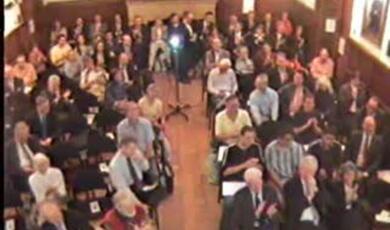The Study of Money May Be The Root Of Much Madness - The Fragile Foundations Underneath Economics
Share
- Details
- Transcript
- Audio
- Downloads
- Extra Reading
Alderman Professor Mainelli introduces the 2015 Long Finance Spring Conference.
Download Transcript
3 March 2015
Introduction to The Long Finance Spring Conference 2015 –
The Study of Money May Be The Root of Much Madness
Alderman Professor Michael Mainelli
Good afternoon Ladies and Gentlemen, and welcome to the Long Finance 2015 Conference on macroeconomics. Mark Twain knew the secret of success - “All you need in this life is ignorance and confidence; then success is sure.”[1] This entire conference is about ignorance of Japanese macroeconomics, so I shall try and give you ignorance, lots of ignorance about macroeconomics, money, and Japan.
These islands have always been singularities – a bunch of emperor-worshipping status-conscious tea-drinking martial folk clinging to the side of a continent. Ooops, that’s the British Isles. Let me start again, Japan, and Britain, can drive you mad.
Japan has always been a singularity. A bit of a Sinophile and a bit of a Nipponophile, I had the fortune of studying East Asian history and politics at Harvard under that great scholar Edwin O Reischauer, from 1961 to 1966 the United States Ambassador to Japan. Then, in the early 1980s, two dazzled tourists in their third decade roamed Asia, my sister and I. I remember wandering the rural villages accompanied by little children chanting behind us, “baka gaijin desu” – “foreigners are stupid”, an old man teaching me how to scrub while naked together. My sister and I knew, with the certainty of wisdom that comes from age, that Asian capitalism wouldn’t change western evening meals or entertainment. After all, who outside Asia would eat raw fish or pay to sing along to canned music? There are websites on amazingly funny Japlish and Engrish mish-mashes, or madnesses foreigners won’t believe about Japan.
My sister went on to live in Japan for many years and learn Japanese. She was followed by my parents who lived there as well and might well have retired there, except that Western pensions aren’t credible to immigration officials. My son too learned Japanese and is emigrating.
We have imported many words from Japanese – manga, sushi, sake, judo, koi, zen – yet we can long afterwards guess their origin. Later, Ian Harris and I wrote a book, Clean Business Cuisine: Now and Z/Yen,assuming that Asia had invented all management theories two and a half millennia before the West. Culture clash is everywhere, including macroeconomics.
Economically, the Japanese, even before the Meiji Restoration, have shown an amazing ability to learn and adapt. From post-war destruction, the Japanese rose again to strike terror across the Occident with these three words, “Made in Japan”. A great colleague, Bill Emmott, editor of the Economist for 13 years, in 1989 wrote The Sun Also Sets: The Limits to Japan´s Economic Power, in which he emphasised Japan’s constant ability to surprise.
Eamonn Fingleton in The Atlantic Monthly in 2011, “The Myth of Japan's 'Lost Decades'” [http://www.theatlantic.com/international/archive/2011/02/the-myth-of-japans-lost-decades/71741/] asked, for example: “Given that Japan's current account surplus (the widest and most meaningful measure of its trade) totaled $36 billion in 1990, what was it in 2010: (a) $18 billion; (b) $41 billion; or (c) $194 billion?” You can guess that the answer was $194 billion. So was Japan so sick, or are the numbers wrong? Oddly, numbers such as longevity and other basics have improved over the past three decades. Without doubt Japan has a demographic crisis but the economic numbers seem divorced from the situation. Paul Krugman, the Nobel economist, wrote in 2013, “while there is much shaking of heads about Japanese debt, the ill-effects if any of that debt are by no means obvious” [5 February 2013 - http://krugman.blogs.nytimes.com/2013/02/05/the-japan-story/?_r=1]
Then Charles Haswell at HSBC recommended I read Richard Werner’s New Paradigm In Macroeconomics: Solving The Riddle Of Japanese Macroeconomic Performance which inspired this symposium. Charles felt Werner’s work was overlooked because ‘riddle of Japanese’ left most macroeconomists cold, while ‘paradigms in macroeconomics’ put Nipponophiles to sleep. Starting with the premise that economists can hardly claim authority if they can't explain the performance of the world's second-largest economy, Werner shows repeated failures of Keynesians, monetarists and other schools. He concludes on a Long Finance note, that economists have to understand money before they move on to macroeconomics. A disturbing read for traditional macroeconomists, a thrilling read for those seeking to build a working financial system. With more time we could go slightly to the west of Japan and examine the heterodox thoughts of Korean Ha-Joon Chang about his country. So why does Long Finance care about far Eastern macroeconomic theory?
Z/Yen’s work at the junction between technology and finance has been inspired by Danny Hillis’s Long Now question, “how could one build a clock to last 10,000 years” ticking once a year, bonging once a century, with a cuckoo squawking once every millennium. Over the years our ignorance about economics, finance, and money grew so much that in 2005 we launched our own Long Finance initiative asking “when would we know our financial system is working?” Could we build a financial system that might last a century? A decade and several economic crises later we have some ideas, and a few possible solutions, but lots more ignorance to share, especially about money.
It’s popular, and easy, and slightly unfair to criticise the economics that accompanied the financial crises. The caricature economist postulates a rational, emotionless, human-being making decisions under conditions of perfect information in competitive markets. Economists themselves have criticised this simple model for decades and have explored all sorts of variants from the non-rational human-beings of behavioural economics and Prospect Theory to different supply and demand curves for positional goods, tournaments, or networks. Economists range across the visible hands of planning, the invisible hands of markets, the translucent hands of decision makers, the helping hands of volunteers, and the grabbing hands of governments.
So how ignorant are we in economics? Quite.
1 – We can’t explain boom and bust. We still argue about the Great Depression and grudgingly concede World War II may have been the economic solution. We don’t understand the hundreds of adjustments to dubious collection procedures that make up GDP. We adjust GDP by several percentage points for the informal economy but then celebrate or bemoan quarterly decimal point changes. 25% to 40% of global trade is non-monetary, so we don’t analyse it. We don’t know at what level of national debt an economy collapses.
2 – Why do we still have poverty in a world where overall production is sufficient? If distribution is the problem, why can’t markets fix this? Since 2003 we’ve been unable to answer this crucial question about Iraq - “how can the world’s largest economy restart a medium-sized economy in the Middle East about the size of California?”
3 – We can’t fix our environmental externalities. Politicians believe economics is wrong and Germany’s Energiewende or the UK’s nuclear extravagances are right. Jeffrey Sachs points to the discount rate “tyranny of the present over the future” - “If the value of the resource is likely to grow more slowly than the market rate of interest, the blaring market signal is to deplete the resource now and pocket the money! … As expected from the theory, slower-growing animals and plants are especially endangered today.” [Sachs, 2008, page 40] Activities which diminish the effectiveness of saving increase the discount rate, thus making us more short-term.
Finance seems easier to analyse than economics. Lots of hard-looking numbers, lot of interesting regulatory loopholes, lots of seductive theories. Come to the City of London Laboratory to play with financial figures in the world’s leading international financial centre. Yet financial theory is a mess of gimmicks rather than a coherent field. The divide between the financial industry and financial academia is large, perhaps larger than any other trade-teaching divide. But the caricature quant who moves to finance from physics studied systems with strong, negative feedback. Otherwise earthquakes, volcanoes, or storms would tear the world apart. One of their biggest mistakes is to assume money is a physical measure of enduring value.
Finance’s fundamental assumption is a recursion that what people believe that other people believe what other people believe, ad infinitum, determines value. When fashion people tell you that “black is this year’s new black”, realize that they are trying to create momentum towards buying their large stocks of dark materials. Human value systems exhibitstrong feed-forward, or positive feedback in the jargon. Of course such strong kurtosis means non-normal distributions. Yet most natural scientists assume normal distributions in finance to make their work easier; in other words they go off to study the Wizard of Oz, not the real world.
So how ignorant are we in finance? Quite.
1 – Price is not a single number. The idealised supply and demand curve is really a cloud of potential matched-pairs, with holes in the cloud where you can’t trade (“I really must sell 47,777 units but they only permit blocks of 10,000 units”), and horrifically complicated by embedded time in contracts. Commodity pricing differs enormously from financial instrument pricing because of delivery cost and risk. Market values for companies differ markedly from book values. If two companies merge or acquire the price is never A+B, rather it’s much higher or lower. Yet we still calculate market capitalisation by multiplying the number of shares by the marginal price of the last-traded share. We confuse the monetary value of a spot transaction with value at scale over time. A multi-year contract has no specific price or value.
2 – Stranded assets. In 2006 Long Finance asked how much CO2 ppm equivalent do you add to the atmosphere when you use all of the fossil fuels on balance sheets. Our figures exceeded 1200ppm without shale gas or tar sands when you burn-it-all. Others such as Carbon Tracker publicised this a few years ago. Markets may be resolving this paradox now in the near-term price of fossil fuels, but how was it overlooked for decades? The music industry is shrinking yet we have more music than ever.
3 – Why are bubbles and scandals big surprises? History is replete with bubbles and scandals presided over by auditors and regulators, from bubbles and scandals of the 16th century to Enron or RBS or Tesco today.
The great test of any body of knowledge is predictive capacity. It’s rather simple for a chief economist. (1) Consumers want goods and (2) companies want to provide them for profit, which (3) creates economic activity. To expand, (4) companies go to financial institutions which must (5) evaluate their credit. Meanwhile, (6) consumers are starting to save and (7) build up assets. These savings (8) go to financial institutions, thus completing the core funding circle. But this funding circle can be enhanced if (9) financial institutions tap into markets. (10) Companies too, with appropriate credit assurances, (11) tap into markets. The core money supply has always been regulated, but now, for the sake of the consumers, regulators watch (12) savings and (13) financial institutions with a new awareness that (14), the money supply is not just cash and (15) is increasing with ease of credit, so (16) financial institutions and their leverage are core to the system. Leverage in turn affects (17) credit and (18) the money supply. Of course, with this much money sloshing around, people can afford to (19) bid up asset prices and, given the increased value of their assets, (20) not save so much and perhaps even (21) play the markets themselves. This makes them (22) more aware of economic activity and (23) brings out the regulators to watch over them. Now thoroughly flush, (24) consumers are more desirous of goods, (25) importing them and (26) increasing economic activity, while (27) exporting countries build up assets and the money supply. All of this economic activity (28) depends on confidence & trust, which in turn builds up (29) credit that finds its way to (30) inflating markets. Naturally all of this trust & confidence are pinned on (31) liquidity. Until it collapses.
A currency trader lives and dies on results. The guys and girls on the currency trading floors recognise that their firm’s chief economists are talking heads with prestigious degrees and nice accents for marketing the firm on television. As we’ve just seen with the Swiss Franc, chief economists can’t predict currency movements. Whether it’s economic figures, interest rates, share prices, productivity, or inequality, our top economists are beaten by monkeys, real monkeys. Burton Malkiel in 1973 said “A blindfolded monkey throwing darts at a newspaper’s financial pages could select a portfolio that would do just as well as one carefully selected by experts”. The Wall Street Journal proved him right. An interesting new MaxPo Discussion Paper demonstrates the self-belief of economists in their superiority despite contrary evidence, yet also that the public believes in them almost as much as they believe in themselves.[2] Naturally, self-confident chief economists don’t ask currency traders to which school of macro or micro economics they subscribe, probably because they’d have their trousers pulled down.
Prognostication, prophecy, and strategic planning help people address their fear of the future. The Nupe are a people in West Africa who have developed a very sophisticated system of prophecy based on patterns in the sand. As one anthropologist studying Nupe prognostication in 1954 noted:
“The most striking feature of Nupe sand divining is the contrast between its pretentious theoretical framework and its primitive and slipshod application in practice.” [Nader, S.F., Nupe Religion, 1954, page 63 from Feyerabend, 1988, page 50]
Human intelligence injects uncertainty into social systems. Intelligence gives social systems the ability to predict their own behaviour, but prediction is often wrong and leads to perverse consequences. Fantasy writer Jasper Fforde’s postulated a “Human Expectation Influenced Probability Theory”. Nupe sand diviners and astrologers exist to keep economists company.
Economists have been creating value since the days of Smith, Ricardo, and Marx. We have labour theories of value, production theories, utility theories, power theories. So how can we calculate and communicate value? We rely on money. But does measuring money really equal measuring value? Are all the theories a waste? Robert Mundell, accepting the 1999 Nobel prize - ‘The main thing we miss today is universal money, a standard of value, the link between the past and the future and the cement linking remote parts of the human race to one another...” In fact it’s so bad that money and finance are typically exogenous to mainstream economic theories. Paradoxically economic theories evaluate themselves using money as a measure.
Anthropologists evaluate money as a community technology akin to music or telephones. Scientists have found that while primates may not create monetary systems, they understand money. Capuchin and tamarin monkeys at Yale grasped the idea of tokens so well that they stopped saving, started raiding, gambling, and prostituting themselves. An old economics rhyme for money is “Money is a matter of functions four, a medium, a measure, a standard, a store.” It is difficult to think of any form of money that has delivered all four matters, “medium, measure, standard, store”, for a significant period of time. To be a medium of exchange brings trade into conflict with storage. To be a standard unit of account means keeping relative value to a basket of needs, but those needs change with technology, scarcity, or fashion. To be a store of value means the community values must persist, the community itself must persist and honour its debts, and some people must be willing to defer gratification, perhaps despite inflation. Bitcoin has been a poor unit of account in its short lifetime, a growing medium of exchange, and a poor store of value, so far.
My definition of money is “a technology communities use to trade debts across space and time” – typically a self-referential token-based system. These tokens of indebtedness are social desires and values frozen at a point in time. The tokens depend on the future persistence of the community and its values.
Fiat, ‘let there be’, currency, the dominant form of money today, is an artefact created by governments. Fiat currency consists of tokens that allow us to extinguish tax debts. We trade those tokens freely in a geographic region where we are likely to meet people under the same tax system. Fiat currency’s value lies in its ability to cancel tax debts. Governments ‘back’ their currencies through their monopoly on the use of force, creating a semi-coerced community of taxpayers. Governments create and destroy fiat currencies at will through borrowing and taxation – budgets are chess games where governments can buy more pieces when they lose. By managing the level of tax debts in the economy, both up and down, governments supposedly create credit that facilitates trade and exchange. Fiat currency is a good medium for near-term exchange within a tax zone, but has traditionally been a variable unit of account that leaks value. Here’s a question, assume an inefficient government doubles its tax take from 20% of GDP to 40%. Assuming no printing of fiat currency and that the government can enforce its tax rates, what happens to the supply and demand curve for its currency? Probable answer: Currency value rises even though the economy may be impaired. This is a core problem. Why should politically issued tax credits equate to the need for trade and exchange? Clearly there is a loose relationship but this is fundamental methodological problem at the heart of macro-economics should terrify anyone using fiat currency to measure value over more than a few years.
To paraphrase John von Neumann on the use of pseudo-random numbers, anyone who considers contrasting the price of a paper clip with the price of an aircraft carrier or a hospital is living in a state of sin. Just for starters, such half-century comparisons using ‘our measure, our standard’ of fiat currency bring into the analysis decades of national debt politics, oligopolistic market structures, and imaginary management accounting rules.
So how ignorant are we about money? Quite.
1 – Kay Ingram said, “Women prefer men who have something tender about them - especially legal tender”. So is a man who has all the money in the world the most attractive? Clearly not, because if you have all the money in the world it has no value. You can see value increase with distribution, two people splitting the money, three, etc. The Thomas Piketty-inspired debate about inequality piques my interest in a set of differential calculations on distribution and monetary value taking into account future population, wealth distribution, tax credit needs, national debt, demurrage, and the strength of the monopoly on the use of force.
2 – If you don’t believe pounds are enforceable tax credits call HMRC and explain that you’re not feeling British this year but will give them a buzz when you do. See what new community you join.
3 – Why can I go to 600 miles to the Shetlands and use pounds but 90 miles to Calais and have to exchange them? Because the French are under a different tax system.
4 – Why can’t you convert your money into GDP?
5 – If every country on earth was prepared to give the UK 100 years of cash, in what currency should we take it?
6 – Why does government currency in a war zone lose so much value? Because people wonder if the government and its tax system will persist in its present form.
7 – peaking of war zones, why is the Euro zone having monetary difficulties? Because the tax basis of fiat currency is not reflected in the construction of the Euro.
Moreover, moving beyond the tax scrip definition of fiat currency, in our current monetary system, fractional reserve banking, we give banks an oligopoly to multiply the amount of currency in circulation. Another term for this is leverage. Leverage permits banks to lend a multiple of what they have on deposit. Other firms can leverage to a small degree, but banks are permitted to do so at levels where any other firm would be considered insolvent. Banks such as RBS had leverage ratios of around 50:1 when the crises began. The permitted maximum is now 33:1. Overall levels are around 15:1. Historical convention is about 10:1. The New Economics Foundation points out that around 97% of money currently in circulation in the UK is actually created by commercial banks. With such swinging multiplication of tax scrip, leaving aside deposits into banks of leverage money that in turn create opportunities for leverage, we really don’t know how much money there is in circulation, by a seriously wide margin. Warren Buffett smirks too, “When you combine ignorance and leverage, you get some pretty interesting results.”
We often fail to recognise that monetary technology evolves, introducing yet more uncertainty. The major changes are every generation or two, the Federal Reserve of 1913, Bretton Woods, perhaps the last one being that great economist, Richard Nixon, dropping the gold standard in 1972. 600 AltCoins have emerged since 2009, with Bitcoin the most prominent. As people use AltCoin technology more, they will question traditional fiat currency more, and in turn the role of governments and taxation in money and value.
After all these uncertainties, I hope that you recognise that we have no theory of value and that you cannot use pounds, euros, dollars, or yen in equations with confidence over large areas or long time periods. Despite their deceptive resemblance to physical measures, you can’t use financial numbers without a deep understanding of the community upon which the money is based, such as Japan.
Voltaire said, “Doubt is not an agreeable condition, but certainty is absurd.” University of Chicago economist Frank Knight (1885–1972) distinguished risk and uncertainty in his 1921 work Risk, Uncertainty, and Profit. Risk is something you can assess by knowing impact and likelihood. Uncertainty is something you realise might happen, but can’t quantify. Black Swans and unknown unknowns are popular party points today. Combining known unkowns and unknown unknowns gives us Knightian ignorance, “are you not thinking what I’m not thinking?”.
Analytical techniques are there to make us feel good about decisions on the future but nobody can answer how to choose the right analytical technique, let alone decide when none will do. But after all, what is our first major choice in life? Whether or not we believe in free will.
Today I want you to take away one definition, one quote, and one observation, along with a whole lot of ignorance. The definition I gave you earlier – “money is a technology communities use to trade debts across space and time”.
The quote to remember when analysing money is from journalist Simon Carr, “Money turns out to be whatever we agree it to be. It is a collective work of the imagination.” [Independent (12 January 2009)]
The observation is that HM Treasury, the Ministry of Defence, HM Revenue & Customs, and the Home Office are symbiotic on the taxpayer. HM Treasury values defence, tax inspectors, and courts because they heighten faith in the persistence of the tax system and thus the currency.
If love of money is the root of all evil, then the study of money must be the source of much madness. While I come to the end of this talk leaving you with much less uncertainty about my chances of a tenured position in a traditional economics or finance department, I do hope I’ve shown you where you should be ignorant about money. It is only appropriate to continue pondering on Japan’s lessons for us with our Long Finance koan, “If you have trust I shall give you trust; if you have no trust I shall take it away”. After all, that’s the key thing about uncertainty; you need to be certain about where to be uncertain.
THANK YOU!
Thanks
Without implicating them in any way and not wanting to dent their track to a tenured post in economics or finance, I would like to thank Dave Birch, Nick Goddard, Stephen Martin, and Jan-Peter Onstwedder for some uncertainty-heightening conversations that helped me with this talk.
© Alderman Professor Michael Mainelli, 2015
[1]Samuel Clemens, 1835-1910, Letter to Mrs Foote, 2 December 1887
[2]Fourcade, M., Ollion, E., & Algan, Y. (2014). The Superiority of Economists. MaxPo Discussion Paper, (14/3) - http://pubman.mpdl.mpg.de/pubman/item/escidoc:2071743:2/component/escidoc:2071741/mpifg_mpdp14_3.pdf
This event was on Tue, 03 Mar 2015
Support Gresham
Gresham College has offered an outstanding education to the public free of charge for over 400 years. Today, Gresham plays an important role in fostering a love of learning and a greater understanding of ourselves and the world around us. Your donation will help to widen our reach and to broaden our audience, allowing more people to benefit from a high-quality education from some of the brightest minds.


 Login
Login







